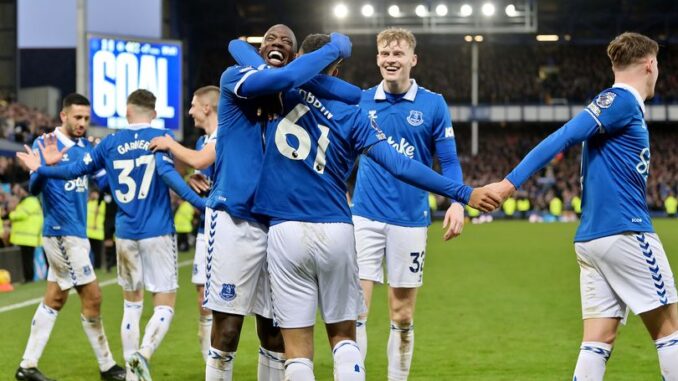
Lazy Everton points deduction claim does Sean Dyche and his players a disservice – and potentially much worse
Our Everton FC correspondent Joe Thomas discusses the significance of refuting the growing narrative that the Blues’ performance is a response to the club’s point deduction in his weekend Royal Blue column.
Everton’s excellent performance is not attributable to the harsh 10-point deduction the team received. Let’s be clear about that.
The question came after the win over Chelsea. Just like it did after the win over Newcastle United. Just like it did after the win over Nottingham Forest. Every time you could sense Sean Dyche preparing to challenge the proposition that ignored the months of hard work – just like the club’s omission from its place near the top of the form guide in a Premier League social media post this week.
One of them is that it would be wrong for a narrative to develop outside of Everton that the potentially crippling sanction ended up being a positive for the club. We need to be clear – 10 points will likely slow progress, hold it back, cost millions in merit payments and mean it has to work even harder to become financially sustainable, which is supposed to be what the profit and sustainability rules are designed to encourage.
On the pitch, this has not been a perfect season for the Blues. The summer was tough as players – for the present and future – were sold to strengthen finances and director of football Kevin Thelwell had to carefully negotiate what deals could be afforded. There was a slow start as the transfer window seeped into the new campaign and, amid that flux, results did not initially arrive. Against that backdrop, Dyche remained insistent that the underlying signs showed promise. The initial difficulties of this campaign serve to make what it has become even more impressive. Whether you are a disciple of xG or not, it is impossible to ignore that results eventually began to vindicate the messaging of those early season press conferences.
They did so well in advance of the startling revelation in November that Everton would receive a 10-point penalty, which was more severe than the penalty for going into administration and effectively put the mid-table team back in the relegation zone. But the final element is crucial. The Blues were compelled to re-enter a war they were first inclined to avoid.
Brighton & Hove Albion was the game that proved a corner had already been turned. The two wins in a week at Aston Villa, in the Carabao Cup, and Brentford showed there was fight in the squad, though the results they were set against – including the awful home defeat to Luton Town – meant the outlook remained glum. The thrashing of Bournemouth ended the home curse and offered reassurance Everton may be better than at least three sides in the Premier League. The win at West Ham United built on that belief – one that was strengthened by the stubborn display, even in defeat, at Anfield one week earlier.
With the benefit of hindsight, the progress was clear before Brighton but it took that game to realise it was not another false dawn. Brighton inflicted one of the most humiliating moments of last season on the Blues when they won 4-1 at Goodison Park in January. To watch Everton get an early goal and match them in the same calendar year showcased impressive progress. The late, cruel Ashley Young own goal cost Everton the win but that disappointment was the dominant post-match emotion told the most important story – Dyche’s men were consistently going toe-to-toe with good teams and were no longer a pushover. Draws were no longer to be celebrated – this was a club beginning to expect victories.
That being said, few expected the win at Crystal Palace. The last match before the international break during which the punishment was announced, Idrissa Gueye’s winner made the rest of the Premier League take note of Everton’s new status as a genuine mid-table side.
The 10-point deduction somehow scrubbed that progress from much of the country’s mind. Coupled with the results the following weekend – including the unfortunate, wondergoal-led deflation at home to Manchester United – the Blues were five points from safety at a time when the club was the focus of international attention. For Everton to have responded to that with three wins in a week that have lifted it back of trouble is impressive but, for the reasons mentioned, this resurgence did not start after the points deduction. Nor has it been sparked by the punishment
To claim that, as has repeatedly been the case by outside commentators, does not do justice to the work already underway at the club before it suffered the deduction. It also has the potential to undermine scrutiny of that process and the challenges to it. No-one is arguing Everton do not deserve sanction but the extent of the penalty appears harsh – even more so with little in the independent commission’s 41-page report to explain the thought process behind it.
This matters because the sanction amounts to a repeat punishment for a club that is progressing toward a more responsible and sustainable financial basis. If the Blues were to lose out on millions of pounds because their league position is several places lower because of the deduction, that will hurt. This season will still have its challenges and if Everton have to wait a few extra weeks to confirm survival, it could lose out on the chance to save further money by being able to forward plan for the following season.
The indications point to a successful season for the Blues. The signs were there long before the deduction of points. Ignoring it is bad for Dyche and his players, but it also might undermine the legitimate requests for investigation and create a procedure that will impede rather than advance Everton’s transition to a sustainable future..
READ NEXT @SPORTUPDATES.CO.UK

Leave a Reply